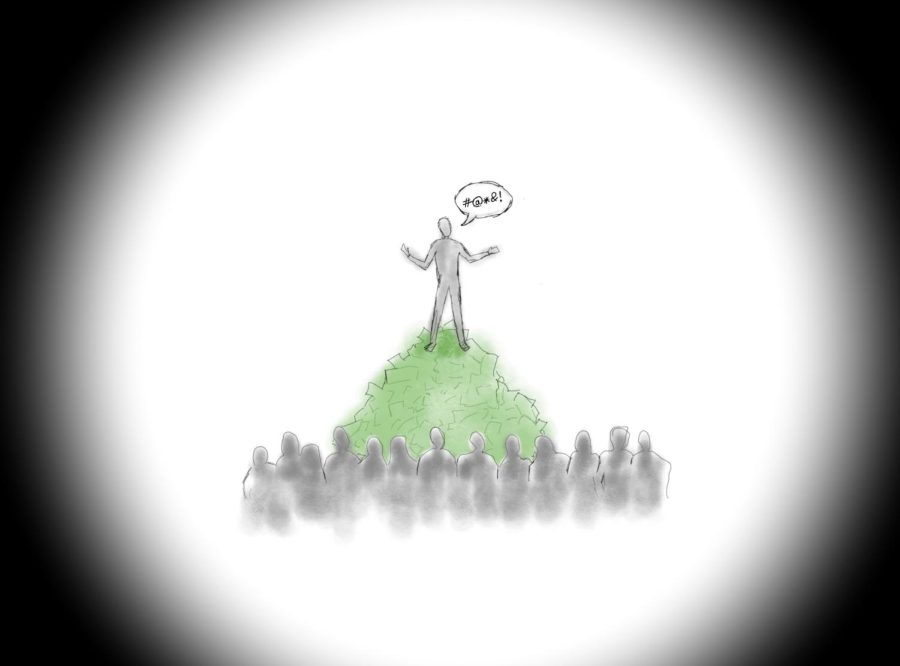You Can’t Separate the Art From the Artist, and You Shouldn’t Try
Supporting a problematic artist allows the problematic behavior to continue.
December 14, 2022
In recent weeks, Ye, formerly known as Kanye West, has found himself involved in far from his first controversy. From announcing his second presidential run, to waging internet war on various other celebrities, to wearing and distributing White Lives Matter shirts, it’s been an especially hectic year for Ye.
Most recently, he has shared a series of blatantly anti-Semitic remarks. Despite denying a connection to any hate group, his statements follow those of various extremist groups.
Just this month, Ye said “I like Hitler” on conspiracy theorist Alex Jones’ podcast, and later went on Proud Boys founder Gavin McInnes’ podcast to say, “You can’t force your pain on everyone else. Jewish people, forgive Hitler today. Let it go. Let it go. And stop trying to force it on other people”.
It seems clear to me that at this point Ye is undeserving of our support. It’s true that he has always been a contrarian, but there’s a line.
At this point, Ye is well past any reasonable line, yet he still is incredibly successful. Brands have cut ties to preserve their image, but Ye has no shortage of supporters among the people. As of December 2022, he has 49.3 million monthly listeners on Spotify.
With the majority of the responsibility resting on the consumers, the question is raised: Can art be separated from the artist?
No, it can’t. The art is the artist.
Google defines art as “the expression or application of human creative skill and imagination.” An artist’s creation is intrinsically linked to the artist because it is that individual’s expression or application of creative skill and imagination.
Even with the same prompt, materials, and training, no two artists will create the same work of art. That’s why artists reach fame. Artistry and creativity are gifts that are made valuable by their uniqueness to the individual.
Vincent Van Gogh’s “Starry Night” is world-famous because Van Gogh saw what nobody else could in the night sky.
It’s the artist’s vision that makes the art, not chance. Every piece of art is the culmination of the artist’s personality, experiences, and biases.
That being said, the emergence of new information concerning the quality of the artist’s character doesn’t affect the technical skill that brought the artist fame. Our interpretation of art changes, but that art doesn’t.
Despite being a sexual predator and exploiting African American rock and roll, Elvis Presley brought musical performance to a whole new level. Both of these facts should be acknowledged. To understand the prevalence and process of celebrities abusing their power, you need to understand their misdeeds and their appeals.
With just a quick view at issues such as these, it’s easy to dismiss them as simply a product of irrationally harsh cancel culture. A common narrative is that this generation is ruining the lives and livelihoods of celebrities over minor offenses, but that’s not the case.
Admittedly, it’s hard to recognize and admit that the art we admire may be created by an egregious person, but that doesn’t change the facts.
Merriam-Webster defines to cancel as “to withdraw one’s support for (someone, such as a celebrity, or something, such as a company) publicly and especially on social media.”
That’s not what’s happening to many artists that have been labeled as “canceled”. Such artists for the most part, still have widespread support and successful careers.
To point to “cancel culture” as the reason an artist is in the news rather than their wrongdoings is an excuse for our general failure to hold artists accountable.
Take Chris Brown for instance. It’s relatively common knowledge that he is a domestic abuser, yet in December of 2022, he still has 50.7 million monthly listeners on Spotify.
Roman Polanski is a convicted child rapist, yet he won a César Award for Best Director in 2020.
After Dave Chapelle was called out for homophobia and transphobia, he was invited on to Saturday Night Live where he was given the chance to further display his bigotry, this time including anti-Semitism.
Each year, new celebrities are revealed to be lacking basic morality, and each year they meet little consequences due to the public’s inaction. As a result, both the celebrity and their unjust actions are excused.
At what point do we understand this as simple moral responsibility rather than “toxic cancel culture?”
The typical reason for an artist’s “cancellation” is no small issue. The way that this generation holds our most popular figures accountable is only a step in the right direction. Especially if the artist is living, to support the art is to support the artist.
As we are constantly reminded, we are promised the right to free speech. This isn’t an opposition to that. Every American has the right to say what they want, but nobody has a right to unconditional financial support.
Choices come with consequences, and one of those consequences should be a boycott of a problematic artist’s art.
Both financial and social support furthers the artist’s platform. A celebrity’s influence is derived from us, and when that celebrity is problematic, their influence can be disastrous.
Celebrities are idolized more than ever. Any celebrity has hordes of people examining and replicating their behavior.
If JK Rowling can maintain book sales through her publication of a transphobic manifesto in 2020, what message does that send to her young and impressionable fans?
Allowing artists to maintain their idol status through problematic behavior affects a lot more than just the artist.
For instance, Michael Jackson’s stardom and wealth played an integral role in manipulating his victims.
Abusers use their wealth, fame, and influence against their victims and to then avoid consequences. A celebrity maintaining their career allows this behavior to continue while also sending the message to the public that what they did isn’t a big deal.
I know where the line is to me, and I encourage you to find where it is for you.
Every individual supporter makes a difference. When we all commit ourselves to withholding our support from problematic artists, that difference is monumental.
Most of us likely have some influence over people in our life. Rather than allowing the problem to continue, you can be part of the solution by setting the example of boycotting celebrities acting immorally.
I think about what I would accept in my personal life. With this thinking, the decision is often clear. For example, I would never knowingly be friends with an anti-Semite, so I don’t listen to Ye’s music.
A celebrity should be cut no more slack than anyone else, and arguably, they should be cut less.
Whatever you determine is egregious behavior, you should not support celebrities acting in that fashion. We have a moral obligation to closely examine the artists we put on pedestals. Whether you claim to be supporting the artist or the art, you’re supporting their behavior.






